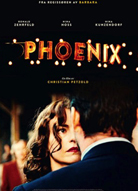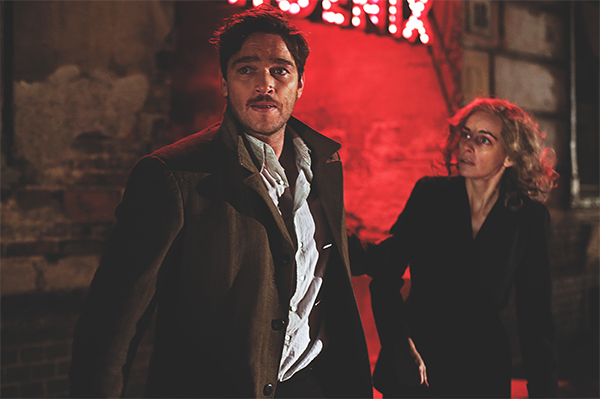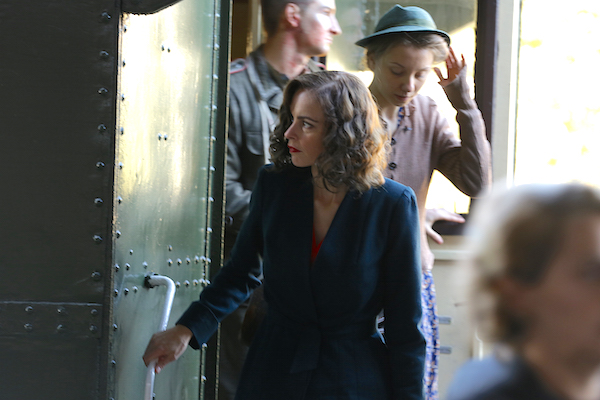 Jose here.
Jose here.
In her six films with director Christian Petzold, Nina Hoss has explored the roles women have played in German history during the twentieth century, in Jerichow she played a postmodern femme fatale trying to convince an Afghanistan veteran to kill for her, in Wolfsburg she played a mother being wooed by the man who ran over her son, in Barbara she was a doctor trying to escape East Germany in the 1980s, and in the post-WWII set Phoenix, which might be their greatest collaboration to date, she plays Nelly, a former cabaret singer who survived a Nazi concentration camp, but was left brutally deformed. As she tries to reclaim her past life through a surgery described as a recreation, rather than a reconstruction, she must come to terms with the fact that she is now living in a world that has very little to do with the one she left behind.
Hoss’ layered performance as Nelly is the kind of work that should be garnering awards buzz, as it helps her establish herself as one of the best living actresses, and places her as Petzold’s greatest collaborator, rather than his muse. In 2014, English speaking audiences got their first taste of Hoss’ brilliance as she managed to steal the show in A Most Wanted Man and Homeland (her character is returning for Season 5) and asPhoenix makes its Stateside debut, it’s about time we all start talking about Hoss more frequently. I had a chance to talk to her to discuss her work in Phoenix and how it relates to classic Hollywood films, as well as her preferred acting method and the career path she might take years from now.
Our interview is after the jump...
JOSE: You’ve talked about using films like Vertigo and Germany Year Zero as references for Phoenix but because of the fact that Nelly was a cabaret singer, and so much of her emotions in the film are expressed through music, it made me think of My Fair Lady and classic Hollywood musicals. Would you say that beyond the noir influences there is also some truth to this being inspired by musicals?
NINA HOSS: I think so yes, especially because she was captured Nelly was a singer, and I always thought she really embraced it, she was a joyful singer in the Berlin clubs, and she has met Kurt Weill and Hanns Eisler and all these people who made music in those days. Music is also something she wants back, so when I was working the character I kept thinking how she would be able to sing again, because if you’re able to sing, you’re open, free and able to express yourself. When you sing you give away a part of your soul, and you can’t do that when you have trauma. For me the character had a lot to do with musicals, and you’re right, it’s a Pygmalion story, so it has to do with My Fair Lady, if Nelly was living in a happier time she would probably be singing all the time. When we made the film we also discussed The Umbrellas of Cherbourg because it’s also a film about the aftermath of WWII and you feel it, the French didn’t let themselves get dragged down, they kept their lightness and immediately went back to find their own identity. Nelly has this stubbornness, and naivety, like a child she wants this back so badly.
JOSE: We know that you can sing very well because of Phoenix and your collaboration with Manic Street Preachers. Can a musical be in the cards for you and Christian Petzold?
NINA HOSS: Oh, I would be up for it immediately! [Laughs] I don’t know if he is, though. He loves them, he probably would set the plot up and then slowly he would let tragedy creep in. I suspect that but I’m sure he would be happy to try it.
Both you and Christian grew up in West Germany and it was easier for you to see Hollywood films than to know what was happening on the other side of the wall, so years later when you ended up making movies together your films became a marriage of trying to make sense of German history through your passion for classic Hollywood genres.
Yeah, I haven’t really thought about it analytically so to speak, but both of us wonder what identity is, what are the characteristics of Germany? How do we define ourselves? What is in this German soul? Where are we heading now? I always have the feeling that Germans are still looking for their identity, and this is of course very interesting to discuss and put into stories, this kind of unsettled feeling that’s in all the movies we’ve done together. My characters are always looking for happiness and lightness, of course this is something that was part of film noir and American “nouvelle vague”, films like Easy Rider which are about wanting to break free, looking who you are as an individual, but also figuring out what is your part in society. We do this without pointing fingers, we’re just asking people how they feel, our movies are intended to be a discussion with people who watch them. We watched Out of the Past in preparation for Phoenix, and I feel that film had a lot to say about what America was at that time, I think this is what Christian is trying to do with films like Barbara and Phoenix, which are set in the past but are also about where we’re headed.

Phoenix is also essentially a film about performance and becoming practically unrecognizable to yourself when playing a part. How do you reclaim your own identity after you’re done with a movie?
I don’t feel I ever lose my identity (laughs), I really want to dive into these characters by understanding them and questioning them. Nelly for instance, I had to simplify her and study her step by step, she is a woman who isn’t given time to understand what has just happened to her, what the world has become. I had to find the strength and the emotions to place my mindset in this time after the Holocaust, but this is my work, I do it with passion, but I don’t do the kind of Method acting where you forget who you are. Although to be honest I don’t think we ever know who we really are. All my characters are part of who I am and they do bring me great joy.
Since you have made so many historical films the research you do must be similar to what archaeologists and anthropologists do in a way, have you discovered things about Germany that have made you understand older generations better?
Yeah, also the older you get and the more you’ve read and seen, you understand that a lot has to do with why these events were possible. It has to do with the German soul, but it also had to do with a moment in time when there were no jobs, society was down, and this was the moment when right wing evil people offered to rescue them, and people were vulnerable and fell for it. If you feel part of something that tells you you are a better human, you feel like you have power, and power is seductive. I’m very aware of that, when you look in the world today, we need to be very careful as to not fall for those things again. I’ve learned to become very aware and ask myself what is it about humans that make us want to destroy each other. I still don’t understand it, but I can analyze it a bit better, I understand it intellectually, but I don’t think I’ll ever understand it emotionally.
Christian’s films have very strong female voices, in part also because of Bettina Böhler’s editing who has done several of his films, and also some of your other projects like Gold. Do you have a close relationship with her, do you get to have any input into what shots are ultimately chosen?
No, by the time they’re editing I’m out of the process, Bettina and Christian have a very close relationship, and I feel like this is another part of the process of making the film for him where he needs to only work with her. The only time I was kind of invited in was in Barbara because there was one particular scene where I knew I’d done something, a gesture that said more than the lines, and they cut that moment. I’m aware that actors can be vain, but I try to look at these things with perspective and to preserve the story so I’m aware that not everything you do is great, but with this moment I knew I had something there (laughs). I asked them to at least try it, Bettina was kind of reluctant, but they ended up putting it back and I think it helped the character. I guess that’s why I never got invited again afterwards (laughs). She’s great though, we have a great relationship, but at that moment you have to step back and let the editor and the director work together.
Your mother is an acting professor, have you given thought to pursuing that at some point?
Maybe, right now I think I’m too involved and curious myself to see how far I can get with the characters I can create. I learned by always watching other actors, even though sometimes they did things I wouldn’t want to do, I learned why I would do things differently. I’m very aware that the teaching process happens while you’re working, I think I might enjoy teaching very much, but a bit later in the future when there are no more good parts for me to play anymore (laughs).
As you’re becoming more recognized in America, you’ve started appearing in English speaking projects like Homeland and A Most Wanted Man, in which to be honest I wanted to see much more of your character. In both of these you play stern secret agents who help the lead male characters in their cases. Are you afraid that Hollywood will typecast you?

Yeah, I’m not worried yet, but I can see that it’s happening [laughs]. I’m also not worried because I love my character in Homeland, every time I get the scripts I’m so curious to learn what’s going to happen to her next, she has this great humor to her and I love that. I don’t think she’s a normal spy, so I enjoy doing it so much. A Most Wanted Man was also such an amazing experience, it was crazy to get to work with Philip Seymour Hoffman. I also get offers from European directors who don’t want to give me the same kind of roles, but let’s see how it goes…
And if Christian doesn’t want to do a musical with you, maybe we can get someone else to do it!
Yes please! I’m up for it, it would be great!

Phoenix is now playing in select theaters.
